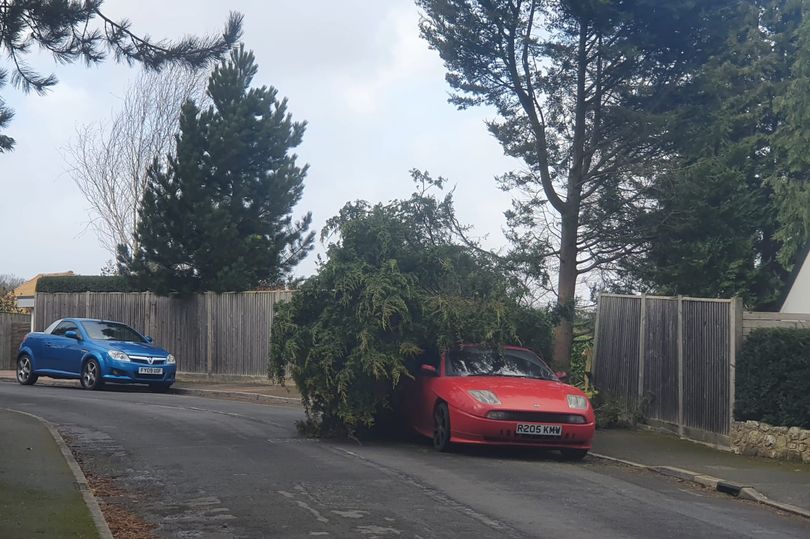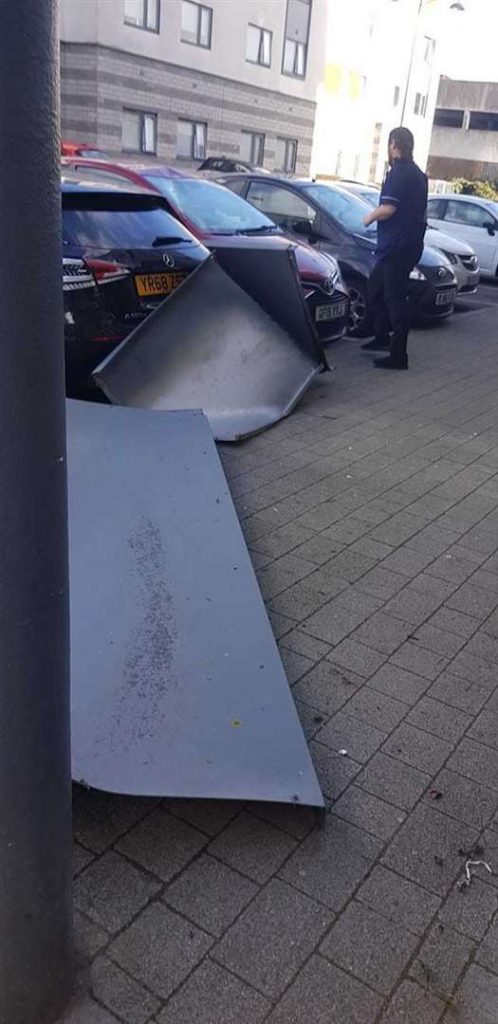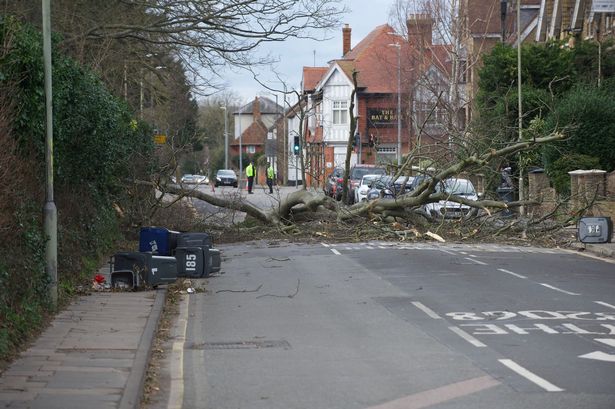For the first time since its introduction 11 years ago, weather warnings from amber to red were raised throughout the country, in preparation for what would turn out to be one of the worst storms to ever hit the UK.
By Friday the 18th of February the abhorrent weather in Kent would hit its peak, with wind speeds reaching up to and beyond 90mph.
33,000 people throughout Kent lost all power to their homes for multiple days with a county-wide repair bill set to reach into the millions.
Trees and other debris were thrown all around the county.

The head of the UK’s forestry society calculated that UK wide, upwards of 8 million trees have been lost due to the storm.
Many of those sadly finding their way onto homes, cars, roads and train tracks.
Train services throughout Kent were cancelled or were supplying rail replacement services, as efforts were made to clear the tracks of debris.
One University of Kent student, Joseph Perez, whose car was damaged by flying debris in the storm recounts his full day of travelling just to get back to Essex.
“Usually, to get back to Basildon from Medway can take anything from 45 minutes to an hour in the car on a good day.”
“On Sunday, after having to use the train after my car was wrecked in the storm. But since none of the trains were running to London that day, it was a combination of rail replacement services and the underground, it took me almost 4 hours to get back, on a journey, that even in the worst M25 traffic wouldn’t take me half that.” He said.
On the roads, cars and lorries were queueing on the M20, on their way to dover to reach the Eurotunnel, while ferries were held at port until the weather warning had been lowered.
Long delays for a number of days, as traffic was queuing for up to five miles at the Dartford Bridge due to its closing during the storm, in turn creating unusual amounts of congestion in the Blackwall tunnel area.
Elsewhere in Medway, the Subway at Gillingham Pier was forced to close after part of the roof came off and fell onto multiple cars in the car park
A staff member said: “Thankfully nobody was hurt.”

Speaking with Emma Zylyfi, 21, whose car was damaged by the fallen bit of roof.
It’s clear that in situations like this, during storms of this magnitude, it’s the individual who will be impacted the most, with companies and businesses that own the building, even after having damaged other parties’ property, are able to be absolved from the incident by claiming it to be an “act of god”.
“On Friday I got a message from a friend saying that the roof panels were blowing around in the wind, and that I should move my car because it was parked underneath it.
“So, I went out to move it and initially the staff didn’t want me to move the car, but I did anyway.”
“Out of curiosity I checked the back of my car to see that it was already damaged.
“I called up my insurance and they said to me in this case because of the weather it would have to be a claim against me.”
“My excess is going to cost me £250, and I will lose all my NCD as it wasn’t protected.” Emma said.
In terms of insurance, an Act of God is an act of nature that couldn’t have been foreseen or avoided. It describes an event: Where no blame can be assigned to a person. That couldn’t have realistically been prevented. Brought about as a direct result of natural causes.
This is a measure put in place by insurance companies that, they would say, allows them to fairly and correctly make decisions on pay outs so that a party will not be found at fault for something that was out of their control.
Sceptics would have you believe however, that this, in essence, allows insurance companies to apply the cost back to the customer.
The effect this has is threefold; insurance companies don’t have to use and in turn, pay to retrieve pay-outs from third parties, it allows the insurance companies to raise premiums and push customers closer to losing any bonus or discount they might have been entitled to.
The roof falling from the Unite Students student accommodation block has affected 5 people, with all their cars damaged to the point of them being undrivable, all now having to deal with the emotional and financial pressures this will now cause.
All now need to pay insurance excess and secure and pay for another vehicle while theirs is being repaired.

Their next insurance premium will be without question higher than it was previously. On top of the recent rise in cost of living, this could easily become too expensive to afford for some. And for those that need a vehicle to get to and from work, could mean destitution.
In a world where global warming is causing more and more extreme weather globally.
The historically relatively calm weather of the UK is evolving into a beast that sees yearly flooding, summer heatwaves and storms of increasing power and ability.
Can this force majeure continue into this uncertain future?
With wild weather becoming less of a novelty and more of an inevitability, can insurance companies continue to allow premiums to rise, only to leave the customer to cover the costs in the end.
At some point the bubble must burst, insurance companies need to do more to protect their customers by acting on their behalf, instead of dismissing claims out of hand in a seeming attempt to make life easier for themselves and harder for the customer.
Unite Students have refused to comment on the situation at this point, stating an investigation currently is being carried out by its estates manager
